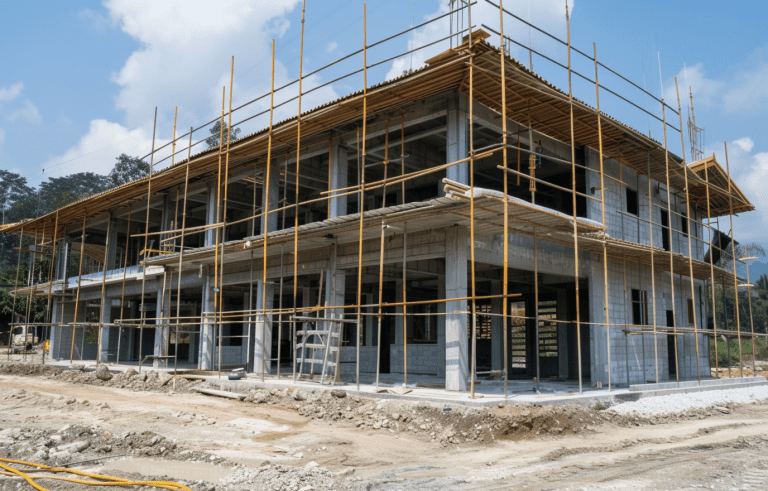
In the realm of Real Estate and Construction, a multinational company has embarked on an exciting project in Bali, Indonesia.
This endeavor involves the development of a prefabricated building, leveraging cutting-edge techniques and materials to provide a comprehensive Business Service.
The KBLI code 41020 encompasses activities involving the installation of factory-produced materials such as precast concrete, steel, plastic, rubber, and other manufactured products using fabrication, erection, and assembly methods for building construction.
Here, prefab technology meets the lush landscapes of Bali, offering efficient, scalable solutions for the burgeoning real estate market.
Dive into how these integrated approaches are setting new standards in the construction industry, making building faster and more efficient than ever.
Overview
This group encompasses activities related to the installation of factory-produced materials such as precast concrete, steel, plastics, rubber, and other factory outputs using fabrication, erection, and assembly methods for building construction.
Legal Basis
The legal framework for prefabricated building construction is governed by the Regulation of the Minister of Public Works and Housing of the Republic of Indonesia No. 6 of 2021, which sets out the standards and requirements for these construction activities.
Type of License
The licensing for prefabricated construction services, particularly for Foreign Direct Investment (FDI) or Penanaman Modal Asing (PMA), follows the regulations outlined in BKPM Regulation No. 4 of 2021.
This regulation specifies an exemption from the minimum investment requirements for foreign investments exceeding IDR 10 billion, exclusive of land and building costs, per construction activity.
Coverage of Service
The scope of services under KBLI Code 41020 includes the installation of prefabricated components like precast concrete and steel for the construction of buildings.
Subclassification code KP001 specifically covers these activities, detailing the precise nature of the construction services provided.
Business Scale, Land Area, and Risk Level
The businesses operating under this KBLI code are considered large enterprises. While the land area for these operations is not regulated, the risk level is categorized as medium-high.
The standard business license required is a “Sertifikat Standar,” which must be renewed periodically.
Authorities Granting Licenses
Licenses for conducting prefabricated building construction are issued by the Minister or the Head of the relevant agency, ensuring that all enterprises meet the necessary regulatory standards and are capable of undertaking large-scale construction projects.
Requirements and Obligations for Business Licensing
Companies must meet the standard capability requirements set for construction services businesses, which include annual reporting of business activities.
They are also obligated to adhere to standards concerning material quality, equipment quality, occupational health and safety, construction procedures, and environmental management.
These standards ensure that the operations not only comply with Indonesian laws but also uphold safety, sustainability, and quality in construction practices.
Resources:
- Online Single Submission System (OSS): The official platform for business licensing in Indonesia.
- Indonesia Investment Coordinating Board (BKPM)
- Indonesian Minister of Public Works and Housing
- Government Regulation No. 5 of 2021 on Risk-Based Business Licensing
- Bizindo.com: KBLI 2020 English in English (with Interactive Table)
Frequently Asked Questions
-
What are the requirements and obligations for obtaining a business license for prefabricated building construction?
Companies must meet the standard capability requirements set for construction services businesses, which include annual reporting of business activities. They are also obligated to adhere to standards concerning material quality, equipment quality, occupational health and safety, construction procedures, and environmental management. These standards ensure that the operations not only comply with Indonesian laws but also uphold safety, sustainability, and quality in construction practices.
-
What challenges or considerations are associated with prefabricated building construction?
While prefabricated construction offers advantages, it also presents challenges such as transportation logistics, site preparation requirements, and the need for specialized knowledge and expertise in assembling prefabricated components. Additionally, certain design limitations may exist due to the modular nature of prefabricated elements.
-
How does the use of prefabricated construction methods align with the goals of multinational companies?
For multinational companies, prefabricated construction methods offer several benefits, including faster project completion times, consistent quality across multiple locations, and the ability to standardize processes and reduce construction costs. These advantages can help multinational companies meet their global expansion goals while maintaining efficient and scalable construction practices.
-
What are the investment criteria for foreign entities in this sector?
Foreign entities must invest more than IDR 10 billion, not including land and building costs, to qualify for conducting prefabricated construction under the specified KBLI code.
Contact Us for Prefabricated Building Construction







